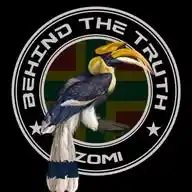
𝔹𝔼ℍ𝕀ℕ𝔻 𝕋ℍ𝔼 𝕋ℝ𝕌𝕋ℍ (𝔹𝕋𝕋)
February 9, 2025 at 06:24 AM
*Day 21: The Digital Frontier – Reconstructing Zomi Identity in the Age of Globalization*
The internet was supposed to bring people together. But for the Zomi, it has done something far more complex—it has reshaped their identity, amplified their struggles, and, in some ways, deepened their divisions. Once bound by shared land and oral traditions, the Zomi now find themselves navigating a *digital landscape that is both empowering and fragmenting*.
In the past, the Zomi identity was preserved through songs, storytelling, and communal knowledge passed from generation to generation. Now, much of that cultural transmission is happening online. Social media platforms have become the *new frontier of identity formation*—spaces where younger generations negotiate their history, their politics, and their place in the world. *Digital activism has allowed Zomi to assert their identity on a global stage*, connecting diaspora communities, advocating for political recognition, and documenting histories that were once at risk of being forgotten.
Yet, this newfound digital presence comes with contradictions. While the internet has provided a space for Zomi voices, it has also exposed them to larger hegemonic forces that shape digital language. Zomi languages, once thriving in oral traditions, are slowly being displaced online by dominant languages or groups. The digital world is not neutral—it favours visibility, and in this algorithm-driven landscape, minority languages struggle to compete. As a result, many younger Zomi are engaging in discourse primarily in external languages, leaving Zomi's linguistic heritage increasingly confined to the past.
*Fragmentation in Digital Spaces*
If colonial borders physically divided the Zomi homeland, social media platforms are now dividing it ideologically. What once was a collective struggle for unity has splintered into factional digital enclaves, where political, religious, and regional differences are magnified rather than reconciled. WhatsApp channels, in particular, have become echo chambers, reinforcing divisions rather than fostering dialogue. Instead of one Zomi identity, there are now competing narratives, each claiming authenticity, each rejecting the other.
The internet has also introduced new *hierarchies of influence*. Those with access to education, technology, and global networks have become the dominant voices in digital spaces, often shaping the discourse around Zomi's identity. Meanwhile, those in rural areas—many of whom still hold traditional knowledge—are being sidelined, their experiences less visible in the online conversation. The same technology that could have democratized identity-building has, in some ways, reinforced *elitism and exclusion*.
*A Double-Edged Sword*
The digital frontier is neither a saviour nor an enemy—it is a tool, and how the Zomi choose to use it will determine the future of their identity. On one hand, it offers an *unprecedented opportunity to document* history, connect communities, and resist erasure. On the other, it presents challenges—*language loss, ideological fragmentation, and the risk of digital colonialism*.
The question remains: *Can the Zomi reclaim the internet as a space of unity rather than division?* Or will the digital world become just another force that fractures their collective identity?
*Reflection:*
How can indigenous and marginalized communities like the Zomi reclaim digital spaces for cultural preservation and unity? What strategies can be used to counter linguistic and ideological displacement in online platforms?
*Quote to Highlight:*
"_The internet did not erase borders—it created new ones. But identity, like history, is a story that can be rewritten_."
BTT
🔴🟡🟢
https://whatsapp.com/channel/0029VaYCqe71yT229xZ6f42y
❤️
👍
😂
34